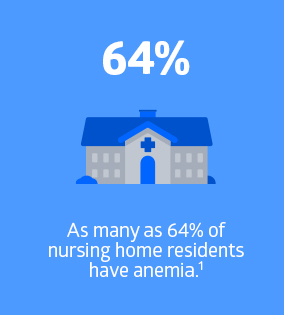Accuracy improves care.
A growing number of long-term care residents have conditions or receive treatments that can skew the accuracy of blood glucose readings, which can lead to inaccurate treatment and dosing. From the #1 supplier of glucose test strips in long-term care, our Harmony Blood Glucose Monitoring System aids in making informed treatment decisions for your most vulnerable residents.
QUESTIONS
Contact a product specialist >

Features
![]() GDH-FAD test strips do not react with any sugars other than glucose, thus providing truly accurate glucose readings
GDH-FAD test strips do not react with any sugars other than glucose, thus providing truly accurate glucose readings
![]() GDH-FAD Chemistry is not affected by changes in Oxygen Levels
GDH-FAD Chemistry is not affected by changes in Oxygen Levels
![]() Small sample size helps with discomfort
Small sample size helps with discomfort
![]() Harmony’s wide hematocrit range allows caretakers to care for higher acuity residents/patients
Harmony’s wide hematocrit range allows caretakers to care for higher acuity residents/patients
Study of Residents on Supplemental Oxygen Therapy
Study goal: accurately capture blood glucose readings across complicated diabetic residents on supplemental oxygen therapy.
Background
Changes in the amount of oxygen dissolved in blood (PO2) cause inaccurate blood glucose readings in devices that utilize the enzyme glucose oxidase.2
Situation
Studies of residents on supplemental oxygen therapy revealed that elevated P02 levels inaccurately underestimated glucose measurements in monitors that utilize the enzyme glucose oxidase.2
Results
The Harmony Blood Glucose Monitor captures glucose readings with an average bias of -2% to 6% in blood adjusted to different oxygen content levels.3
Takeaway
The Harmony Blood Glucose Monitor has the ability to capture accurate test results across a wide range of blood oxygen content.
Study of Residents with Anemia
Study goal: accurately capture blood glucose readings across complicated diabetic residents with anemia.
Background
Anemia, a condition in which there is a lack of healthy red blood cells to carry adequate oxygen to the body’s tissues, may falsely elevate diabetic test results.4, 5
Situation
Approximately 64% of chronic skilled-nursing home residents are diagnosed with anemia with 11.4% having anemia of moderate severity (hemoglobin of ≤10 g/dl or hematocrit of ≤ 30%).1
Results
When compared to a laboratory-grade glucose analyzer, the Harmony Blood Glucose Monitor demonstrated an average of ±2% bias at hematocrit values below 20%.3
Takeaway
The Harmony Blood Glucose Monitor has the ability to capture accurate test results across a wide hematocrit range.
*LTC GHX 2017 data
1. Artz AS, Fergusson D, Drinka PJ, et al. Prevalence of anemia in skilled-nursing home residents. Arch Gerontol Geriatr 2004;39:201-6.
2. Tang et al. Oxygen effects on glucose meter measurements with glucose dehydrogenase- and oxidase-based test strips for point-of-care testing. Crit Care Med. 2001; 29(5):1062-1070.
3. Data on File: Harmony Hematocrit Tolerance
4. Dimeski G, Jones BW, Tilley V, Greenslade MN, Russell AW. Glucose meters: evaluation of the new formulation measuring strips from Roche (Accu-Chek) and Abbott (MediSense). Ann Clin Biochem 2010;47:358-65.
5. Teodorczyk M, Cardosi M, Setford S. Hematocrit compensation in electrochemical blood glucose monitoring systems. J Diabetes Sci Technol 2012;6:648-55.
